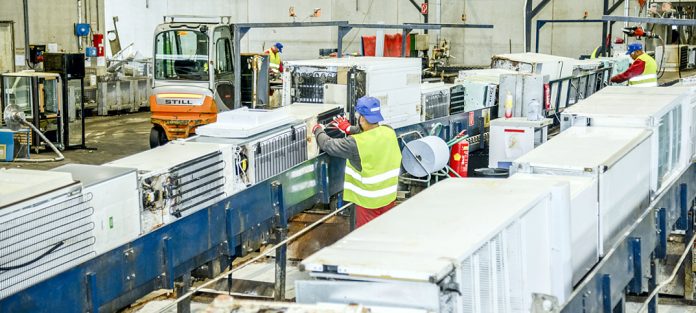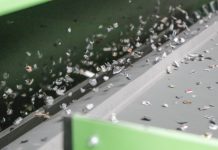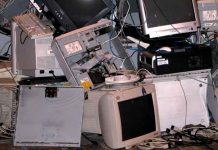EU study shows: Better rules for managing discarded fridges and freezers could save as much CO2 as 2.5 million cars being taken off our roads.
A new study commissioned by the European Commission found that up to 6.3 million tonnes of CO2-equivalent emissions could be saved every year if Cenelec standards for treatment of discarded fridges and freezers were made mandatory across Europe.
Considerable emission savings would be enabled by requirements for a more cautious and thor-ough extraction of refrigerants and foam propellants from old appliances in recovery facilities, and stricter transport rules that would lead to fewer leaks in transit. Many refrigerants and propellants used in such discarded appliances are very climate-damaging and may also pose a risk to the ozone layer.
Following the publication of the study, 12 environmental NGOs and representatives of waste treatment operators have issued a call for setting new European legal requirements to improve e-waste treatment, collection, logistics and preparation for reuse on the basis of the existing European Cenelec standards.
Requirements of Cenelec standards describe the state of the art for an environmentally safe recycling of cooling appliances. However, in many cases throughout Europe, refrigerators and freezers are not treated according to this state of the art, leading to 6.3 million tonnes of avoidable CO2-equivalent emissions every year. Reasons include inaccurate manual removal of refrigerants, poor technical equipment, or rough handling of devices. This is particularly a problem in those countries in which Cenelec requirements are not made binding.
The Commission should go further and enforce stricter rules
Fanny Rateau, Programme Manager at ECOS, said: “We did know that poor management of discarded fridges and freezers had disastrous consequences for the environment but now a European study has put official numbers on the size of the problem. This needs to be a turning point to radically change the rules for the treatment of these appliances. The Cenelec standards should be the baseline of EU-wide requirements. The Commission should go further and enforce stricter rules: reuse and recycle operators have the responsibility to keep us safe from the huge amount of global warming gases contained by old cooling appliances.”
Barbara Metz, Deputy Executive Director at Deutsche Umwelthilfe (DUH), said: “If a refrigerator is returned to an official collection point, you cannot be sure that it is treated correctly in all EU countries. For example, in Germany, we have evidence that minimum quality standards are not met in several plants. Recyclers do not recover sufficient quantities of propellants or simply claim water to be recovered pollutants. Therefore, we urge that Cenelec standards become a mandatory prescription for recycling of cooling equipment throughout Europe.”
Stéphane Arditi, Director for Policy Integration and Circular Economy at the European Environmental Bureau (EEB), said: “In addition to higher legal requirements, the European Commission must ensure the enforcement of existing rules. We must avoid a situation like in France for example, where Cenelec standards are mandatory but only three out of 11 plants can prove compliance because of poor enforcement. Regulations on electric waste recycling must be monitored efficiently by a credible and independent surveillance system.”
We call on the European Commission to adopt an EU Implementing Act under Article 8(5) of the WEEE Directive, laying down ambitious minimum quality standards as soon as possible. Cenelec requirements for recycling of fridges and freezers must be introduced into European law in a way that is coherent and avoids loopholes. The ball is now in the court of the European Commission to seize this opportunity and choose an ambitious path for the safe and environmentally-sound collection, logistics and treatment of e-waste in the EU, fit for the 21st century.
Source: Deutsche Umwelthilfe








